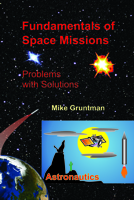 Rocket and Spacecraft Propulsion
Rocket and Spacecraft Propulsion
astronauticsnow.com/aste575
 Rocket and Spacecraft Propulsion
Rocket and Spacecraft Propulsion
ASTE 575
Viterbi School of Engineering (VSOE)
University of Southern California (USC)
Mike's other class – ASTE 520 Spacecraft System Design
About USC Astronautics (ASTE) ASTE's 20-th Anniversary
 Instructor:
Mike Gruntman
on LinkedIn
in Wikipedia
in Grokipedia
Instructor:
Mike Gruntman
on LinkedIn
in Wikipedia
in Grokipedia
Founder of the USC Astronautics Program
Professor of Astronautics
Mike has been teaching ASTE 575 Rocket and Spacecraft Propulsion since the mid 1990s. Originally, the course number was (AE, AME, and finally ASTE) 470 and changed to 575 for administrative purposes in 2023. Graduate students as well as seniors took the course.
In the mid-1990s, Mike introduced a new course section for a growing category of online students (working full time in space industry and government centers) through the USC Viterbi's Distance Education Network.
The course Rocket and Spacecraft Propulsion became a must for science and engineering students, regardless of their major, considering professional careers in the space industry, rocketry, space operations, and government space research and development centers.
In the early 2010s, Mike significantly updated the content of this required course on rocketry and propulsion and resumed its annual teaching in 2014. The new richly illustrated class notes included more than 650 pages.
The last time, he offered ASTE-575 in Spring 2025.
During 2014-2025, more than 850 graduate and senior students enrolled in his Rocket and Spacecraft Propulsion.
In total (including the 1990s), more than 1200 students took the class.
|
160+ problems with detailed solutions
|
 |
|
|
|
|
|
Space: From Firecrackers to Interstellar Flight
|
Analysis of satellite launch by North Korea in December 2012 and ballistic missile threat
|
Hole and leak at the International Space Station, August 2018
|